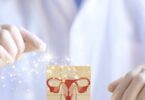The thyroid is located in the front of the neck below the larynx. The vital endocrine gland is shaped like a butterfly and plays a major role in metabolism, growth, and maturation. To do this, it releases thyroid hormones into the blood. The thyroid gland is also of central importance for the female cycle and plays an important role for our fertility. Even preliminary stages of hypothyroidism or hyperthyroidism can lead to significant menstrual cycle and fertility disorders. Therefore, thorough evaluation of thyroid function is an important part of any fertility treatment.
Info box
Hypothyroidism is a pretty common condition where the thyroid gland doesn’t produce enough thyroid hormone, which can slow down your metabolism.It’s also known as an underactive thyroid, and it can cause symptoms like fatigue, weight gain, and increased sensitivity to cold temperatures.
On the other hand, hyperthyroidism is when the thyroid gland produces too much thyroid hormone, which can speed up your metabolism. Also known as an overactive thyroid, this condition can cause a variety of symptoms, including weight loss, hand tremors, and a rapid or irregular heartbeat.
Examination of thyroid function
For examination, a blood sample is required. In the lab, they can determine the so-called TSH value from this sample. The thyroid-stimulating hormone (TSH) is a hormone that is produced by the pituitary gland and controls the production of thyroid hormones. Changes in TSH value in blood allow conclusions to be drawn about thyroid function: reduced TSH values are an indication of an overactive thyroid gland (hyperthyroidism). Elevated TSH levels are in turn an indication of an underactive thyroid gland (hypothyroidism). TSH values are usually given as µIU/ml or mIU/l, i.e. amount or units per volume. Values between 0.27 – 4.20 µIU/ml are considered usual reference values for adult women, but other empirical values (see below) should be taken into account if you are trying to conceive.
If the TSH deviates from the normal range, the next step is usually to examine the free thyroid hormones fT3 and fT4, and possibly also the so-called TPO antibodies (antibodies against thyroid peroxidase), which can be used to determine whether an autoimmune thyroid disease of the Hashimoto type is present. Hashimoto’s thyroiditis is a painless inflammation of the thyroid gland caused by the body’s own antibodies (TPO antibodies) and the body’s own white blood cells (T-lymphocytes).
Thyroid dysfunction of all kinds has a major impact on ovarian function and can lead directly or indirectly to ovarian failure. (Latent) Hypothyroidism can result in hyperprolactinemia. Implantation of the embryo is often difficult, too. If TPO antibody titers are greatly increased, the risk of miscarriage can be elevated.
Info box: hyperprolactinemia
Hyperprolactinemia is when the level of the hormone prolactin in blood is too high. This is quite normal during breastfeeding. The hormone prolactin is produced in the pituitary gland and controls the menstrual cycle and milk production during breastfeeding. An excess of prolactin outside of breastfeeding comes with decreasing libido and the absence of menstrual bleeding.
Adjusting the thyroid gland
Due to the great importance of healthy thyroid function as described above, it has proven to be useful to ensure that the TSH is set relatively low and does not exceed 1.5 mlU/l when you are trying to conceive.
Treatment
The thyroid hormone L-thyroxine is used for treatment. It is taken on an empty stomach in the morning. Regular checks allow the dose to be individually adjusted with the aim of achieving a TSH in the low-normal normal range (0.4-1.5 mIU/l).
According to studies, a good adjustment of the thyroid function significantly improves the success of fertility treatment: In a review article from 2013, several studies with a total of 220 patients were evaluated. It was shown that thyroid adjustment with L-thyroxine significantly improved the success rates of fertility treatment, the risk of miscarriage and the course of the pregnancy (Velkeniers et al, 2013).
Important to know: High-titre TPO antibodies can also inhibit the nidation of the embryo (implantation) even though thyroid function may otherwise seem normal. Treatment with selenium can then reduce inflammatory activity and antibodies levels. In addition to that, Hashimoto patients are recommended to pay attention to a low-iodine diet, since an excess of iodine can worsen thyroid inflammation. Specialized fertility vitamins especially for Hashimoto patients therefore contain selenium in an iodine-free combination with folic acid and all other vitamins important during preconception. Please ensure that you continue to take your thyroid hormones on an empty stomach in the morning and your fertility vitamins by the end of your breakfast.
Thyroid and pregnancy
Your health care provider will continue to monitor your thyroid function throughout your entire pregnancy in order to reduce the risk of miscarriage, premature birth and other problems during pregnancy and to ensure the best possible conditions for the healthy development of your baby.
Don’t be surprised if you need more thyroid hormones during pregnancy than before. Many metabolic processes increase during pregnancy (after all, a new life is growing inside you), so that more hormones are needed to make that possible.
Patients with Hashimoto’s love it that their symptoms likely decrease during pregnancy. This is due to increased production of the so-called pregnancy hormone progesterone, which weakens the immune system. This allows the body to better tolerate anything “foreign”, such as the unborn child.
Your baby will soon begin to produce its own thyroid hormones and needs iodine for this, therefore a mother’s iodine demand increases during pregnancy. Even Hashimoto patients should now supplement iodine. This means that they are now switching from the specialized fertility vitamins for Hashimoto’s patients to “normal” pregnancy vitamins with iodine.
After childbirth
In most cases, the dose of your thyroid hormones will have to be adjusted again after the delivery. Discuss this with your doctor.
Hashimoto patients should be prepared for the fact that Hashimoto flare-ups can be triggered after pregnancy due to the drop in progesterone and that symptoms may increase. Therefore, the thyroid values should be checked at short intervals for about six months.
Around 10% of all women – including those who have never had problems with the thyroid gland before – develop thyroid inflammation for the first time in the first six months after childbirth. This form of Hashimoto’s thyroiditis, also known as postpartum thyroiditis, fortunately does not lead to chronic thyroid dysfunction in 9 out of 10 cases. Nevertheless, thyroid function should be monitered regularly.
Breastfeeding
Women with thyroid disorders can breastfeed their baby without a problem. However, discuss the dosage of your medications with your doctor as demand may change during breastfeeding.
Good to know: Your baby is already producing its own thyroid hormones. For this, it needs sufficient iodine from breast milk. The nursing mother therefore has an increased need for iodine. For this reason, it is advisable to take an iodine-containing prenatal supplement.
Only some thyroid patients have to be careful not to take in too high amounts of iodine, e.g. with active Graves’ disease and hyperthyroidism – talk to your doctor and get advice.







